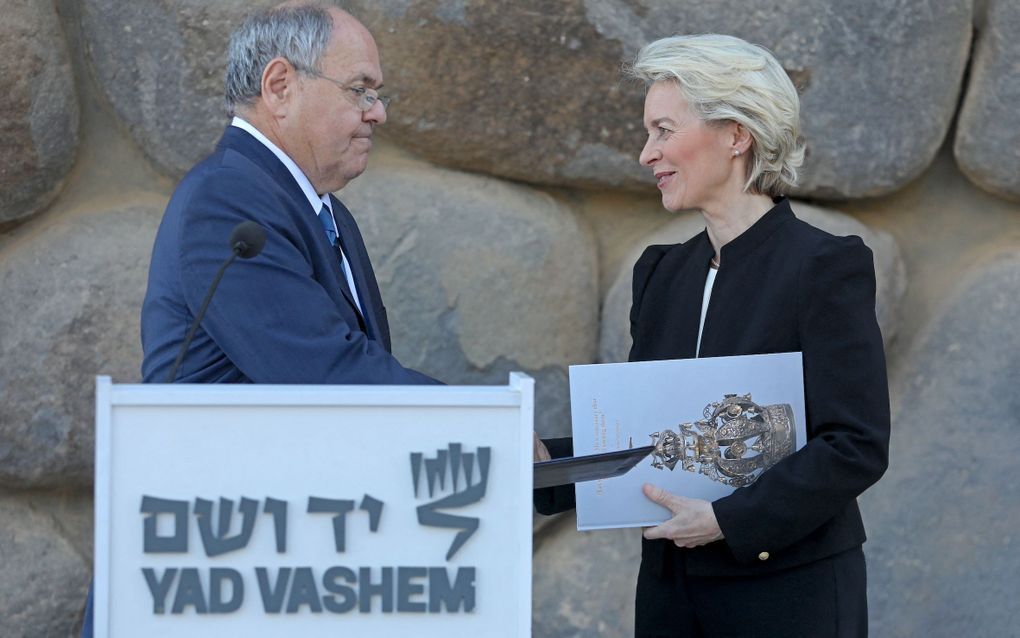Why the new EU Parliament might be more Israel-friendly

European Commission leader Ursula von der Leyen (right) in Yad Vashem in Israel, June 2022. Photo AFP, Gil Cohen-Magen
European Union
After analysing the final results of the European elections, the European Coalition for Israel (ECI) expect the news EU Parliament to be more pro-Israel. The most Israel-friendly parties in the ECI’s research won the most, whilst the most critical parties lost.

While meeting with US partners and policy makers in New York and Washington DC last week, ECI Founding Director Tomas Sandell gave a first assessment of the vote’s consequences, he wrote on Tuesday in ECI’s newsletter.
In an interview with Yossi Lempkowicz from the European Jewish Press on Monday, Sandell stated that “the election result indicates that the new European Parliament has the potential of becoming more pro-Israel.”
His assessment is based on ECI’s Israel vote ranking, released in April before the EU elections on 6-9 June. The ranking revealed that those parties that gained more seats in the polls (European Conservatives and Reformists, ECR +7 and Identity & Democracy, ID +9 and European Peoples’ Party +14 seats) are also the most Israel-friendly in the European Parliament. The Greens, the Left, and the Liberals, which are more anti-Israel, suffered losses (Greens -19 and Liberal Renew -22 seats).
Still, Sandell is concerned by the radicalisation of Alternative for Germany (AfD). “But other far-right parties such as Brothers in Italy and Vox in Spain seem to be moving more towards the mainstream.”

In the EJP interview, Sandell said: “We should at least give them a chance and relate to them party by party, country by country, and not generalise.”
Notably, two EU experts showed themselves a bit more hesitant about the right-wing parties in Europe in an op-ed in The Jerusalem Post.
Vox
ECI also analysed national parties and their voting on Israel. The Spanish opposition group Vox topped the ranking. The research was based on the voting record over the last five years among the 196 national parties in the European Parliament.
Most of the Israel-friendly parties are right-wing and conservative. The fourth-ranked party, though, is the Dutch Reformed SGP party.

The Brussels-based European NGO also made “bottom ten” national parties. It turned out that the Bloco de Esquerda (Left Bloc) from Portugal is the most critical. The former terrorist group Sinn Fein from Ireland has the third position. Three Spanish parties are in the top ten. All those parties belong to the Left group in the European Parliament.

Ursula
The debate has started about the top positions among the 27 government leaders. Present European Commission President Ursula von der Leyen has a good chance for a second mandate. Since October 7th, she has been supporting Israel’s right to self-defence.

From the Israeli perspective, the most critical position is that of the High Representative, who has the initiative regarding foreign policy. The present High Representative, Josep Borrell, has been more critical of Israel. According to ECI, he has even been “campaigning openly against Israel.”
Borrell is a former Spanish foreign affairs minister. Sandell would support a new foreign policy chief from a Central or Eastern member state. He says those leaders have a “more realistic” view of Israel and Russia.
According to the media, potential candidates include Estonian Prime Minister Kaja Kallas and Polish Foreign Minister Radosław Sikorski.
In ECI’s presentation, it is clear that the Western European member states are much more critical than the Eastern EU countries. Ireland has the lowest percentage, 23 per cent, and Poland has the highest rate, 75 per cent.
The EJP analysed the elections in which the Prime Ministers of two of the most anti-Israel member states, Spain and Belgium, suffered a heavy setback. Belgian Prime Minister Alexander De Croo, who had called for a review of the EU’s trade relations with Israel, resigned following parliament elections in his country, which saw the Flemish nationalists and French-speaking liberals become the first parties in Flanders, Wallonia, and Brussels.
Goldschmidt

Pinchas Goldschmidt, the head of the Conference of European Rabbis, wrote in early June on Politico that it was difficult for the Jews to vote in the European elections. Traditionally, Jews vote centre or left. The right-wing parties were seen as contaminated by anti-Semitism.
During the last decade, however, right-wing parties developed in other directions. Being more critical towards Islam meant that they embraced Jews and the state of Israel. In Germany, France and The Netherlands, some Jews openly supported right-wing parties, according to Goldschmidt. Still, he was not sure whether the right-wing parties were to be trusted as Jews.
Related Articles









